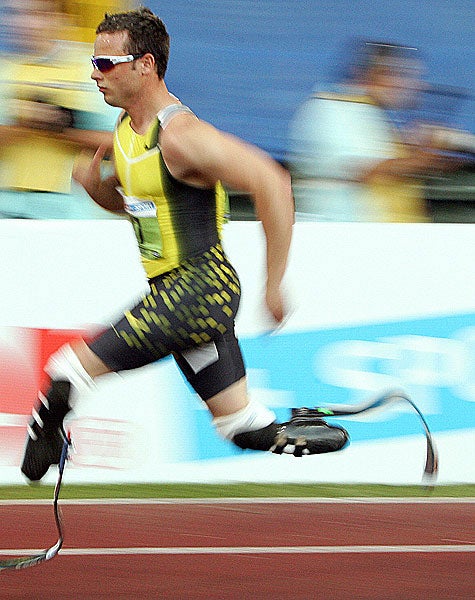Double-amputee wins appeal to aim for Olympics

Your support helps us to tell the story
From reproductive rights to climate change to Big Tech, The Independent is on the ground when the story is developing. Whether it's investigating the financials of Elon Musk's pro-Trump PAC or producing our latest documentary, 'The A Word', which shines a light on the American women fighting for reproductive rights, we know how important it is to parse out the facts from the messaging.
At such a critical moment in US history, we need reporters on the ground. Your donation allows us to keep sending journalists to speak to both sides of the story.
The Independent is trusted by Americans across the entire political spectrum. And unlike many other quality news outlets, we choose not to lock Americans out of our reporting and analysis with paywalls. We believe quality journalism should be available to everyone, paid for by those who can afford it.
Your support makes all the difference.The double-amputee sprinter Oscar Pistorius won his appeal today and can compete for a place in the Beijing Olympics.
The Court of Arbitration for Sport ruled that the 21-year-old South African is eligible to race against able-bodied athletes, overturning a ban imposed by the International Association of Athletics Federations.
CAS said the unanimous ruling goes into effect immediately.
"As you can imagine I have been struggling to hide my smile for the last half an hour," Pistorius told reporters in Milan, Italy. "I can definitely say the truth has come out. We have the opportunity once again to chase my dream of participating in an Olympics, if not in 2008 then in 2012."
Pistorius must still reach a qualifying time to run in the individual 400 meters at the Aug. 8-24 Beijing Games. However, he can be picked for the South African relay squad without qualifying.
Pistorius appealed to CAS, world sport's highest tribunal, to overturn a Jan. 14 ruling by the IAAF which banned him from competing against able-bodied runners. The IAAF said his carbon fiber blades gave him a mechanical advantage.
A two-day hearing was held before a panel of three arbitrators at CAS headquarters last month.
"The IAAF Council's decision of 14 January 2008 is revoked with immediate effect and the athlete is eligible to compete in IAAF events," CAS said Friday.
The IAAF said it accepted the binding decision.
"Oscar will be welcomed wherever he competes this summer," IAAF president Lamine Diack said in a statement. "He is an inspirational man and we look forward to admiring his achievements in the future."
Pistorius holds the 400 meter Paralympic world record of 46.56 seconds, but that time is outside the Olympic qualifying standard of 45.55. His training has also been disrupted by the appeal process.
Even if Pistorius fails to get the qualifying time, South African selectors could add the University of Pretoria student to the Olympic 1,600-meter relay squad.
Pistorius would not require a qualifying time and could be taken to Beijing as an alternate. Six runners can be picked for the relay squad. Pistorius also expects to compete in Beijing at the Sept. 6-17 Paralympic Games.
The verdict also clears Pistorius to dedicate himself to competing at the 2012 London Olympics.
The IAAF based its January decision on studies by German professor Gert-Peter Brueggemann, who said the J-shaped "Cheetah" blades were energy efficient.
Pistorius' lawyers countered with independent tests conducted by a team led by MIT professor Hugh M. Herr which claimed to show he doesn't gain any advantage over able-bodied runners.
CAS said the IAAF failed to prove that Pistorius' running blades gave him an advantage.
"The panel was not persuaded that there was sufficient evidence of any metabolic advantage in favor of a double-amputee using the Cheetah Flex-Foot," CAS said. "Furthermore, the CAS panel has considered that the IAAF did not prove that the biomechanical effects of using this particular prosthetic device gives Oscar Pistorius an advantage over other athletes not using the device."
Pistorius was born without fibulas — the long, thin outer bone between the knee and ankle — and was 11 months old when his legs were amputated below the knee.
Pistorius' American lawyer was thrilled by the verdict.
"He simply has the chance now to compete fairly and equally," Jeffrey Kessler told The Associated Press. "We are particularly pleased that the decision is unanimous."
Join our commenting forum
Join thought-provoking conversations, follow other Independent readers and see their replies
Comments